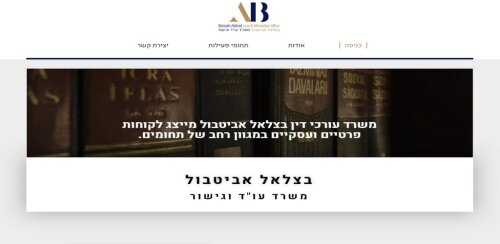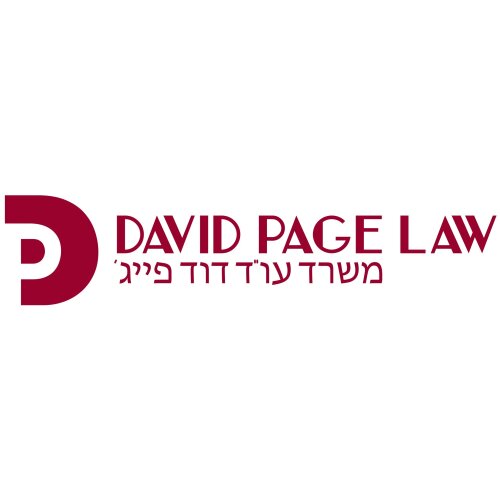Best Trusts Lawyers in Israel
Share your needs with us, get contacted by law firms.
Free. Takes 2 min.
Or refine your search by selecting a city:
List of the best lawyers in Israel
About Trusts Law in Israel
Trusts in Israel are governed by the Trust Law, 5739-1979, which establishes the legal framework for creating and managing trusts. Trusts are arrangements where a trustee holds and manages assets for the benefit of beneficiaries. They can serve various purposes, such as estate planning, protecting assets, charitable giving, and more. Understanding the intricacies of Israeli trust law is vital for those looking to establish or manage a trust in the country.
Why You May Need a Lawyer
Trust law can be complex and having an experienced lawyer can ensure compliance with legal requirements and protect your interests. Common situations where legal advice is beneficial include:
- Setting up a new trust to ensure it meets all legal and tax obligations.
- Managing disputes among beneficiaries or between trustees and beneficiaries.
- Modifying or terminating an existing trust.
- Understanding tax implications and strategies associated with trusts.
- Navigating the cross-border aspects of trusts if international elements are involved.
Local Laws Overview
In Israel, trusts function under specific statutes and legal interpretations. Key aspects include:
- Trustee Duties: Trustees have the fiduciary duty to act in the best interests of beneficiaries and must adhere to the trust's provisions.
- Trust Creation: Trusts can be established by a written agreement approved by all involved parties.
- Tax Considerations: Israeli law provides specific tax rules for trusts, which vary based on residency and the nature of the trust.
- Beneficiary Rights: Beneficiaries have rights to information regarding the trust and can hold trustees accountable for breaches of duty.
- Revocable vs. Irrevocable Trusts: Israeli law distinguishes between these types, impacting control and asset protection.
Frequently Asked Questions
What is a trust?
A trust is a legal arrangement where one or more trustees hold and manage assets for the benefit of designated beneficiaries under specific terms.
Who can be a trustee in Israel?
Any capable individual, including foreign nationals, or a corporate entity can be appointed as a trustee in Israel.
Are trusts subject to tax in Israel?
Yes, trusts may be subject to Israeli taxes based on factors such as the residency of the settlor and beneficiaries and the structure of the trust.
Can a trust be created without a written agreement?
While an oral agreement may lead to a trust under certain conditions, a documented agreement is strongly recommended to avoid disputes and ensure clarity.
What types of assets can be held in a trust?
Trusts can hold a wide range of assets, including real estate, securities, cash, and personal property, subject to legal requirements.
How can a trust be modified or revoked?
The trust's terms dictate modification or revocation; some may require court approval while others follow a simpler process.
What happens if a trustee fails in their duties?
Beneficiaries or interested parties may take legal action in court to address breaches of fiduciary duty by trustees.
How are trusts used in estate planning?
Trusts are employed in estate planning to manage and protect assets, designate heirs according to the settlor's wishes, and potentially reduce estate taxes.
Can a trust be challenged in Israel?
Yes, challenges can arise, typically based on claims of undue influence, lack of capacity, or misinterpretation of terms, often requiring legal adjudication.
What is the difference between a public and private trust?
Public trusts are for charitable purposes benefiting the public at large, while private trusts benefit specific individuals or groups.
Additional Resources
To learn more about trusts and seek guidance, consider consulting the following resources:
- Israeli Bar Association: Offers legal directories and information on finding qualified trust law attorneys.
- Israel Tax Authority: Provides insights into tax regulations pertaining to trusts.
- Trustee Organizations: Professional groups and forums that focus on trust management and legislation updates.
Next Steps
If you're seeking legal assistance with trusts, consider taking the following steps:
- Determine your specific needs and goals for the trust.
- Consult with a legal expert specializing in Israeli trust law.
- Prepare relevant documents and information about your assets and intended beneficiaries.
- Collaborate with your lawyer to draft or revise necessary trust agreements.
- Stay informed of any legal changes affecting trust law in Israel and adjust your plans as necessary.
Lawzana helps you find the best lawyers and law firms in Israel through a curated and pre-screened list of qualified legal professionals. Our platform offers rankings and detailed profiles of attorneys and law firms, allowing you to compare based on practice areas, including Trusts, experience, and client feedback.
Each profile includes a description of the firm's areas of practice, client reviews, team members and partners, year of establishment, spoken languages, office locations, contact information, social media presence, and any published articles or resources. Most firms on our platform speak English and are experienced in both local and international legal matters.
Get a quote from top-rated law firms in Israel — quickly, securely, and without unnecessary hassle.
Disclaimer:
The information provided on this page is for general informational purposes only and does not constitute legal advice. While we strive to ensure the accuracy and relevance of the content, legal information may change over time, and interpretations of the law can vary. You should always consult with a qualified legal professional for advice specific to your situation.
We disclaim all liability for actions taken or not taken based on the content of this page. If you believe any information is incorrect or outdated, please contact us, and we will review and update it where appropriate.
Browse trusts law firms by city in Israel
Refine your search by selecting a city.
















